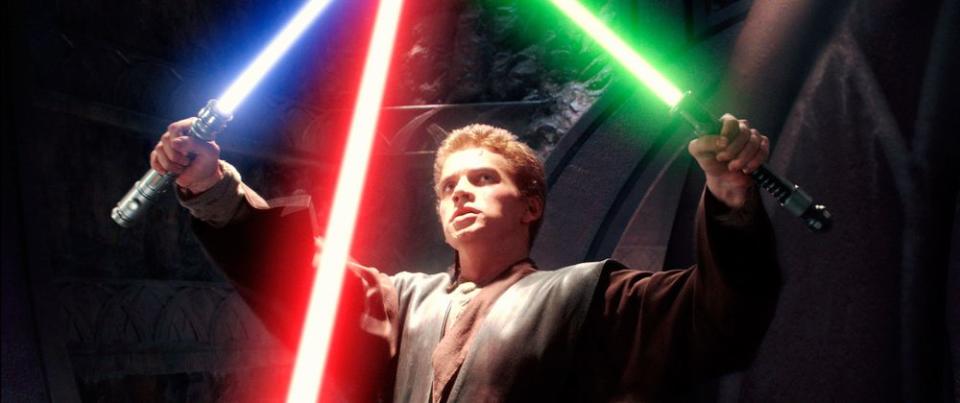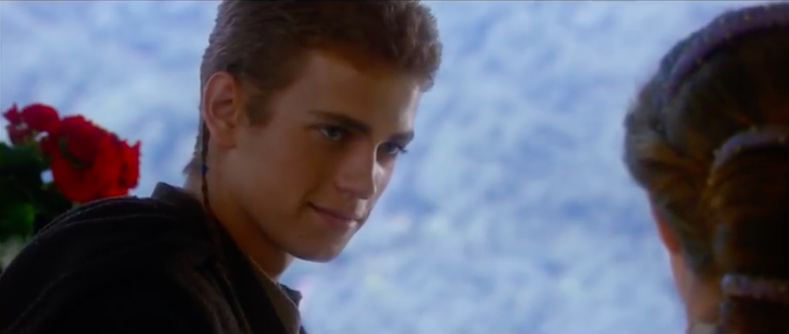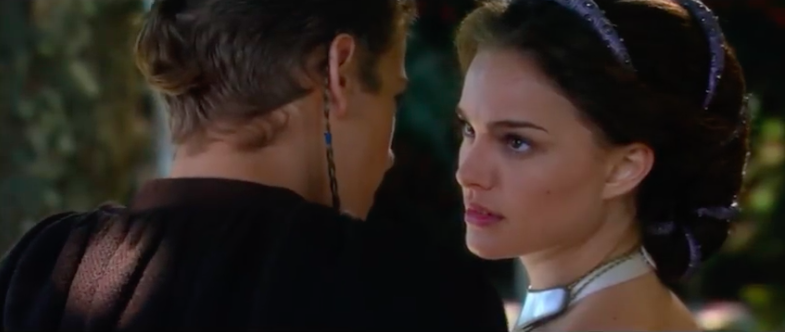Star Wars rewatch: Why is Attack of the Clones so heartless?

As we count down to The Rise of Skywalker (Dec. 20), Entertainment Weekly critic Darren Franich is looking back on every film in the Star Wars franchise. Last week: Trade routes. Next week: Younglings. And check out Entertainment Weekly’s new Star Wars podcast!
“Several thousand solar systems,” reads the opening crawl, “have declared their intentions to leave the Republic.” Several thousand! On this side of the screen, we only ever get to experience the one. And our system’s shrinking: When Star Wars: Attack of the Clones hit theaters in 2002, there were still nine planets.
So credit this second prequel for expansive possibility. The Phantom Menace contracted its cinematic universe into parliamentary hotel hallways. There was also that return trip to Tatooine — and Return of the Jedi started this retreading years earlier, another adventure propelling desert to Death Star.
The high I’m chasing with Star Wars demands new thrills: Worlds within worlds, glimpsed outside a speeding window between blaster fire. And Clones has sequences that tap the primal Glance-Around-the-Cantina energy. The ships look cooler, for one thing. Senator Amidala (Natalie Portman) flies a mirror-plated galacti-yacht, which floats downward over cloudy Coruscant in the moody opening scene. Later, Count Dooku (Christopher Lee) floats between starscapes in an insectile vessel powered by giant swirling parachute. A sailboat for space? That’s the smart kind of silly, a hysterical travesty against logic.
Whereas: So much about Attack of the Clones is the silliest version of smart. Here’s another parade of dignitaries, long conversations on terrible couches, banal governmental hyperrealism crafted by someone who hates politics too much to understand it. George Lucas internalized all the Phantom Menace criticisms, and his response runs deeper than reducing the role of Jar Jar Binks (Ahmed Best). Anakin Skywalker (Hayden Christensen) begs his mentor Obi-Wan Kenobi (Ewan McGregor) not to give him “another lecture” on “the economics of politics.” That line comes right before Obi-Wan jumps headfirst through a 700th floor window into a multi-elevation car chase. You sense a direct response to any Too Slow-niks in the audience: You wanted action? Here’s a fast and furious Jedi!

Then the hot-rodding ends, and we’re into a goofball counterplot web. Obi-Wan shows up at a hidden planet, where a race of X-Files aliens have bio-engineered an entire clone army for the Republic. That army, it emerges, grew from the DNA of Jango Fett (Temuera Morrison). Jango just tried to assassinate Padmé: Quite a coincidence!
I suppose you can’t blame clones for the murderous actions of his source-material bio-daddy. Still, imagine: You trip, fall, and land on an army big enough to assault several thousand solar systems. The army belongs to you now, and by the way, this planet-scorching space force sprouted from the genetic code of a guy who just tried to kill your friend.
You might ask some follow-up questions. Assume the worst about the Jedi High Council, though. Are they supposed to be ridiculous yes-man saps cut off from society with no awareness of the problems facing Republic citizens, or is that just a fascinating narrative accident? Padmé asks why an explosion just incinerated her fellow citizens, and Mace Windu (Samuel L. Jackson) monotones a brush-off explanation: “Our intelligence points to disgruntled spice miners on the moons of Naboo.” Well, one may well inquire, will we be responding somehow to this disgruntlement? And what has occurred in the spice industry to disgruntle the miners so?
Instead, the senator firmly declares her (accurate) theory that renegade ex-Jedi Count Dooku was behind the attempt. “He’s a political idealist, not a murderer,” says that tall-headed toady Ki-Adi-Mundi (Silar Carson). Right, because when have ideological extremists advocating for a society-splitting secession ever murdered anyone?
You could go crazy pondering the Clone Wars. There have been wonderful close reads of the logistical incoherence therein. And plot nonsense does not have to be a problem! I’ve only recently caught up with Genndy Tartakovsky’s 2003 Clone Wars spin-off, a blitzkrieg burst of science-fantastical majesty set in the prequel time frame. A few strung-together three-minute episodes of that short-run cartoon could feature skulltech biker gangs, subaquatic scuttle tanks, midair lightsaber duels, a monolithic quake-tank stabbing pits into a battlefield like a giant tectonic hole-puncher. (Not currently on Disney+, sadly.)
The problem with Attack of the Clones is a total lack of personality. This isn’t just a stylistic critique: It’s the whole narrative. In this movie, armies are industrialized toward inhumanity: Soldier droids on Geonosis, behavior-modified clones on Kamino. They’re identical Nobody militaries. We’re not looking for War and Peace here. One frequent complaint about the prequels was the lack of a Han Solo archetype, all flagrant fun. I think what you really miss, though, are second-tier recognizables like Kenneth Colley’s scaredy-cat Admiral Piett, or Jabba’s shirtless Rancor trainer (Paul Brooke) crying for his monster baby, or even the X-Wing pilots with nifty personalized helmets.
In Attack of the Clones, there are generals and then there are faceless soldiers. And even the people in charge are mass-manufactured. The Jedi knights, turns out, are an emotionless priestly overclass raised in a society of parentless tutorials. Anakin’s big issue, amazingly, is that he really misses his mother — a big no-no. In Phantom Menace, Mace Windu declared prepubescent Anakin “too old” for training. Say, just what kind of indoctrination ritual are they running in this freak temple, where you take a vow of celibacy sometime around kindergarten?
This hyper-specialization is a cultural norm. Padmé recalls her first-ever preteen love, Palo: “We were both in the legislative youth program.” That phrase stinks of Old Etonian aristocracy. Anakin and Padmé will have a couple kids, and one notional tragedy we attach to those children is that they are orphaned, growing up separated into foster families. There’s evidence, though, that this would’ve been their destiny in regular Republic society: shuttled off to boarding school for babyfaced benevolent despots, getting midichlorian measurements for potential Padawanhood just in time for their sixth birthday.
Here, then, is the final battle of Attack of the Clones: a showdown between multiple assembly lines. Perhaps you’re inclined to excavate military-industrial thematics here. Palpatine (Ian McDiarmid) is the secret benefactor behind all these shell companies, running both sides of the war. There’s a dismissive sourness here, though, too morose for satire. We’re at the outer limits of Lucas’ imagination, and all he can do is fill in the blanks with blanks.
And remember: This is another bad Star Wars prequel that would prove stunningly influential for film productions, leading theaters around the world to convert to digital (or die). And you have to remember the essential reason for the cinematic transition away from shooting on celluloid: Digital video was cheaper. That doesn’t immediately mean worse, of course. But despite a $100-million-plus price tag, Attack of the Clones is the first Star Wars that feels cut-rate. All the human action in the gladiatorial finale looks painful, the worst possible combination of community theater stage combat with Virtua Fighter. The big battle scene is all digital ragefuzz firing fleshless energy rocketry. Of course, nobody needs an artist on the assembly line.
—————————————————
There is one fascinating possibility you cannot overlook here. Remember: Anakin Skywalker is a terrible human being, an eventual mass murderer running military maneuvers for a genocidal Empire. He’ll strangle his commanders, and slice off his son’s hand. Lucas (and Luke Skywalker) would argue that he was redeemable. You wonder what the citizens of Alderaan would say about that, or the families of Rebel pilots gunned down by Vader’s bespoke TIE fighter. I know, I know, Darth Vader is cool — but you wouldn’t want to stage a philosophical defense of his actions. (The argument turns into “He vas only following orders!” faster than you think.)
Attack of the Clones is our first proper introduction to Anakin Skywalker as an adult. And it turns out this incredibly superpowerful young man, raised with messianic potential by a lawman caste of spiritual zealots, is… a lovesick proto-fascist egomaniac, with a habit of killstreaking through tribal humanoids on the principle that they are “like animals.”
Credit that second bit as a vengeful overreaction from a grieving son. Seriously, though, is he supposed to be a such a creep? Certainly, he’s a walking How-To-Not for young men with a crush. The first thing he says to Padmé Amidala — a powerful politician he’s tasked with to guarding — is that she’s “grown more beautiful.” Okay, okay, some tongue-tied banter from a guy raised without social niceties. (It’s almost textual that Anakin’s a never-been-kissed virgin.) This is his whole move, though: “You’re exactly the way I remember you in my dreams,” he might say, or this choice exchange:
PADMÉ: Please don’t look at me like that.
ANAKIN: Why not?
PADMÉ: It makes me feel uncomfortable.
You can explain away this material. Lucas was terrible with love dialogue, so he and co-writer Jonathan Hales are coughing up rom-com banter sans rom and com. Portman is a good actress playing a bland character, and Christensen is a bland actor playing a bland character, so they’ve got the chemistry of two chess pieces. There’s a tangible effect created by the artistic lacking, though. Re-examine these close-ups, right before Anakin kisses Padmé for the first time:


Can you sense a strong emotional divide here? How would you describe the look on her face? I read boredom, disbelief, even an eye-roll. Later, Anakin cries over how the kiss was her fault:
I’m in agony. The closer I get to you, the worse it gets. The thought of not being with you makes my stomach turn over. My mouth goes dry. I feel dizzy. I can’t breathe. I’m haunted by the kiss you should never have given me. My heart is beating, hoping that kiss will not become a scar. You are in my very soul, tormenting me.
That’s gaslighting behavior. Too harsh? Even if you’re cutting serious slack for (awful) melodrama, certain lines jump out now for pure Inappropriate Andy awkwardness. Here’s Anakin outside Padmé’s bedroom: “She covered the cameras. I don’t think she liked me watching her.” Not to worry, though, his powers offer total surveillance: “I can sense everything going on in that room.” How fun for her — or anyone, for that matter, who dares to close the door on a Jedi knight.
Actually: Is this why Jedi are sworn against relationships? Are their abilities dangerous, a gateway to Orwellian omniscience — or, hell, subtle telepathic suggestions? Padmé asks Anakin, “You gonna use one of your Jedi mind tricks on me?” Holy hell, does that ever happen?
While you’re pondering that, don’t forget the symbolic triangulation entrapping Anakin between his mom (Pernilla August) and Padmé. “I keep dreaming about [my mother],” the young Padawan says, before noting, “I’d rather dream about Padmé.” Later, Anakin will say, “I saw my mother. She is suffering, Padmé. I saw her as clearly as I see you now.” Freud would have a field day — and then Anakin jumps onto Amidala’s bed with his lightsaber out.
I know this is a rabbit hole, but with 2019 eyes, there’s a tangible new terror underlying Attack of the Clones. It’s there when you discover, casually, that Luke Skywalker’s grandmother was a slave who married the farmer who owned her — Faulknerian family history, left freakishly unpacked. Anakin Skywalker is a very modern grotesque, the obsessive romantic who isn’t shy about declaring that democracy blows.
And consider poor Padmé Amidala, a woman surrounded by men she can’t depend on. She says Count Dooku tried to assassinate her — and the Jedi hand-wave her home, in time to miss a crucial civilization-altering vote about a military armament. Obi-Wan doesn’t trust her, because she’s a politician. Anakin’s making goo-goo eyes. The chancellor is too busy for her theories, slash he’s secretly a Dark Lord of the Sith. Can someone find this poor woman just one ally? “Representative Binks, I know I can count on you,” she says: Her death warrant, signed.
[Next: Revenge of the Sith]
Related content:

